The National Defence Academy (NDA) and Combined Defence Services (CDS) exams are among the most prestigious competitive exams in India. A key segment of their General Knowledge paper is history, with ancient history being a significant component. Preparing effectively for this section can be challenging, but solving multiple-choice questions (MCQs) is an invaluable strategy for success. Here’s why solving MCQs is essential for mastering ancient history in the NDA and CDS exams:
Importance of Solving MCQs for Ancient History
1. Enhances Conceptual Clarity
Ancient history covers a vast timeline, including topics like the Indus Valley Civilization, Vedic Age, Mauryan and Gupta Empires, and early South Indian kingdoms. MCQs compel you to recall facts, dates, events, and their significance. Regular practice with MCQs helps cement these concepts and ensures a clear understanding of the subject matter.
2. Improves Retention and Recall
Ancient history is rich in dates, dynasties, and terminologies. Solving MCQs regularly reinforces your memory, enabling quicker recall during exams. For instance, remembering that Ashoka’s conversion to Buddhism occurred after the Kalinga War becomes easier when revisited in multiple formats through MCQs.
3. Time Management Skills
Both the NDA and CDS exams are time-bound, and answering 100-120 questions in a limited time requires speed and accuracy. Practicing ancient history MCQs trains you to analyze questions swiftly and choose the correct option, an essential skill for these exams.
4. Familiarity with Exam Patterns
MCQs provide insight into the type and difficulty level of questions asked in the NDA and CDS exams. For instance, questions on ancient history often test:
- Chronological order of events (e.g., Mauryan vs. Gupta timeline)
- Cultural contributions (e.g., art and architecture of the Gupta period)
- Religious developments (e.g., spread of Jainism and Buddhism) Practicing these patterns ensures you’re well-prepared for similar questions in the actual exam.
5. Identification of Weak Areas
While practicing MCQs, you may find certain topics more challenging—perhaps the Sangam Age literature or the details of the Vedic texts. Identifying these weak areas early allows you to focus your efforts and improve before the exam.
6. Builds Confidence
Solving MCQs under exam-like conditions boosts confidence. Repeatedly answering questions correctly reinforces your belief in your preparation and reduces pre-exam anxiety.
7. Application of Knowledge
MCQs often require more than rote learning; they test your ability to apply historical knowledge. For example, a question may ask which Mauryan ruler was responsible for establishing diplomatic relations with Hellenistic kingdoms, requiring you to connect facts logically.
8. Comprehensive Coverage
Ancient history MCQs often touch upon multiple subtopics within a single question set. This ensures holistic revision and minimizes the chance of skipping any important topic.
Tips for Effective MCQ Practice in Ancient History
- Use Standard Sources: Refer to NCERT books, standard reference materials, and reputable online platforms for high-quality MCQs.
- Solve Previous Year Papers: Analyzing past NDA and CDS exam papers helps you understand recurring themes and frequently asked questions.
- Set a Timer: Practice solving MCQs within a specific time frame to simulate real exam conditions.
- Analyze Mistakes: Review incorrect answers to understand the underlying concepts and avoid repeating errors.
- Incorporate Quizzes and Mock Tests: Regular participation in online or offline quizzes and tests keeps your preparation dynamic and engaging.
Conclusion
Ancient history is a fascinating yet intricate subject, and mastering it is crucial for success in the NDA and CDS exams. Solving MCQs is not merely a practice tool; it is a comprehensive approach that enhances understanding, boosts retention, and builds exam-day confidence. By incorporating consistent MCQ practice into your study plan, you can maximize your chances of acing the history section and moving closer to your dream of joining the armed forces.







